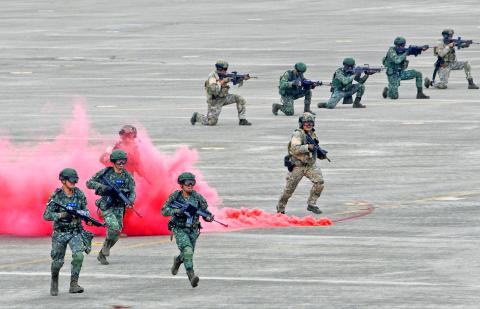The details of a piece of US Senate legislation released on Wednesday revealed calls for US troops to participate in Taiwan’s military exercises and vice versa, a part of efforts by US lawmakers to support Taiwan amid what they see as a rising military threat from China.
The US Senate Committee on Armed Services on May 24 passed the National Defense Authorization Act (NDAA) for fiscal 2019, which includes several provisions aimed at strengthening Taiwan’s military capabilities.
Section 1243 of the act reiterates Washington’s decades-long stance that the Taiwan Relations Act and the “six assurances” are cornerstones of US-Taiwan relations.

Photo: Sam Yeh, AFP
In line with these cornerstones, the US should “strengthen defense and security cooperation with Taiwan to support the development of capable, ready and modern defense forces necessary for Taiwan to maintain a sufficient self-defense capability,” the bill reads.
The US secretary of defense should also promote US Department of Defense policies concerning exchanges that enhance the security of Taiwan, “including US participation in appropriate Taiwan exercises, such as the annual Han Kuang exercise” and vice versa, it says.
The Han Kuang military exercises are Taiwan’s largest annual military drills. They are held in two stages: computer-aided war games and live-fire drills staged nationwide.
This year’s computer-aided war games were held from April 30 to May 4. The live-fire exercises began on Monday and end today.
This year they featured Coast Guard Administration personnel and civilian drone operators for the first time, making use of all levers of national power in military planning, the Ministry of National Defense has said.
The Senate bill calls on both nations to expand cooperation in humanitarian assistance and disaster relief, and urges the secretary of defense to consider supporting a visit by a US hospital ship to Taiwan as part of the US Navy’s annual Pacific Partnership deployment to improve disaster response planning and readiness.
The bill must still be passed by the full Senate and signed by the president before it becomes law.
The US House of Representatives on May 24 passed its version of the fiscal 2019 NDAA.
The US Congress has over the years passed a number of pro-Taiwan laws to show support for the nation, including the Taiwan Travel Act in late February, which encourages meetings and visits by high-ranking US and Taiwanese government officials.
Asked for comment, Presidential Office spokesman Sidney Lin (林鶴明) yesterday expressed the government’s gratitude to the Senate for its support of Taiwan’s national security.
“Taiwan’s national security and self-defense capabilities will continue to be a focus for the government,” Lin said.
Ministry spokesman Major General Chen Chung-chi (陳中吉) also offered thanks to the Senate.
“Taiwan will gladly be a part of endeavors to promote regional security and stability,” Chen said.
Chen quoted Confucius’ saying that “virtue is not left to stand alone. He who practices it will have neighbors,” saying that the ministry believes that Taiwan would be able to work with other democratic nations.

Seventy percent of middle and elementary schools now conduct English classes entirely in English, the Ministry of Education said, as it encourages schools nationwide to adopt this practice Minister of Education (MOE) Cheng Ying-yao (鄭英耀) is scheduled to present a report on the government’s bilingual education policy to the Legislative Yuan’s Education and Culture Committee today. The report would outline strategies aimed at expanding access to education, reducing regional disparities and improving talent cultivation. Implementation of bilingual education policies has varied across local governments, occasionally drawing public criticism. For example, some schools have required teachers of non-English subjects to pass English proficiency

‘FORM OF PROTEST’: The German Institute Taipei said it was ‘shocked’ to see Nazi symbolism used in connection with political aims as it condemned the incident Sung Chien-liang (宋建樑), who led efforts to recall Democratic Progressive Party (DPP) Legislator Lee Kun-cheng (李坤城), was released on bail of NT$80,000 yesterday amid an outcry over a Nazi armband he wore to questioning the night before. Sung arrived at the New Taipei City District Prosecutors’ Office for questioning in a recall petition forgery case on Tuesday night wearing a red armband bearing a swastika, carrying a copy of Adolf Hitler’s Mein Kampf and giving a Nazi salute. Sung left the building at 1:15am without the armband and apparently covering the book with a coat. This is a serious international scandal and Chinese

TRADE: The premier pledged safeguards on ‘Made in Taiwan’ labeling, anti-dumping measures and stricter export controls to strengthen its position in trade talks Products labeled “made in Taiwan” must be genuinely made in Taiwan, Premier Cho Jung-tai (卓榮泰) said yesterday, vowing to enforce strict safeguards against “origin laundering” and initiate anti-dumping investigations to prevent China dumping its products in Taiwan. Cho made the remarks in a discussion session with representatives from industries in Kaohsiung. In response to the US government’s recent announcement of “reciprocal” tariffs on its trading partners, President William Lai (賴清德) and Cho last week began a series of consultations with industry leaders nationwide to gather feedback and address concerns. Taiwanese and US officials held a videoconference on Friday evening to discuss the

PERSONAL DATA: The implicated KMT members allegedly compiled their petitions by copying names from party lists without the consent of the people concerned Judicial authorities searched six locations yesterday and questioned six people, including one elderly Chinese Nationalist Party (KMT) member and five KMT Youth League associates, about alleged signature forgery and fraud relating to their recall efforts against two Democratic Progressive Party (DPP) legislators. After launching a probe into alleged signature forgery and related fraud in the KMT’s recall effort, prosecutors received a number of complaints, including about one petition that had 1,748 signatures of voters whose family members said they had already passed away, and also voters who said they did not approve the use of their name, Taipei Deputy Chief Prosecutor